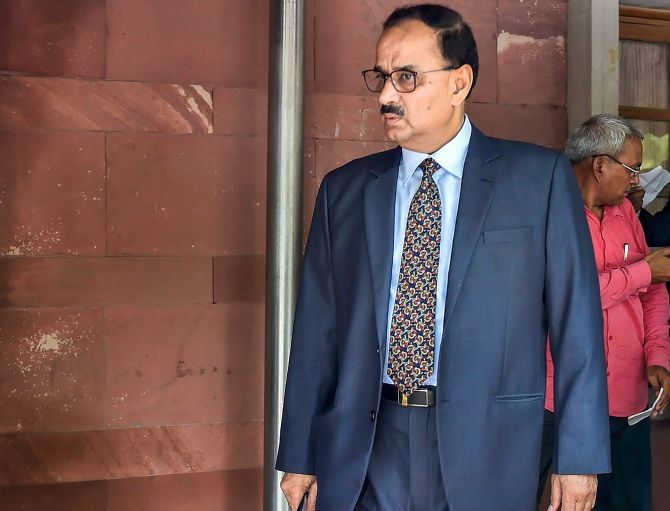The apex court agreed to hear on October 26 the petition by Verma challenging the government’s decision.

Central Bureau of Investigation Director Alok Kumar Verma on Wednesday told the Supreme Court that divesting him of his powers “overnight” by the Centre amounts to interference in the independence of the agency whose probes against “high functionaries” may not take the line desirable to the government.
He said the Centre and the Central Vigilance Commission’s move was “patently illegal” and such interference “erodes” the independence and autonomy of the premier investigating institution.
The apex court agreed to hear on October 26 the petition by Verma challenging the government’s decision. He has said in the petition that the CBI should be kept independent of the Department of Personnel and Training, which has jurisdiction over the probe agency, since it seriously hinders the CBI’s independent functioning.
He said that as the CBI is expected to function completely independently and autonomously, there are bound to be occasions when certain investigations into high functionaries do not take the direction that may be desirable to the government.
The petition was mentioned for urgent hearing before a bench of Chief Justice Ranjan Gogoi and Justices S K Kaul and K M Joseph by Verma’s advocate Gopal Shankarnarayanan. He assailed the decision divesting the CBI chief of his powers and sending him on leave in view of the internal feud between Verma and Special Director Rakesh Asthana.
He also challenged the decision of the government by which Joint Director M Nageswara Rao, a 1986-batch Odisha cadre IPS officer, has been given charge as head of the probe agency.
“Over the recent past, although all functionaries within the CBI from the investigating officer and the superintending officers up to the Joint Director and the Director have agreed on a certain course of action, the Special Director has been of a different view,” the plea said.
It alleged that “hurdles posed” by Asthana have now been compounded by his complicity in “concocting evidence” to impugn the reputation of Verma, leading to a separate FIR being registered by CBI which has been challenged by the special director in the Delhi high court.
“As matters stood thus, the CVC and the central government have overnight taken the impugned decisions to divest the petitioner of his complete role as Director CBI and to appoint another individual in his stead. These actions are patently illegal for the reasons...,” it said.
The petition also said that as the apex court has repeatedly stated that CBI ought to be insulated from the government, the present actions give serious credence to the requirement that the agency be given independence from the DoPT.
Verma has said he has complete confidence of his officers within the organisation and any illegal interference of this nature not only erodes the independence of the institution but also the morale of its officers.
He urged the court to stay the government’s decision to divest him of powers and send him on leave so that such external interference does not occur again.
“The details of many of the cases which have led to the present circumstances are extremely sensitive and cannot with full responsibility be divulged in the present pleadings. The petitioner shall, however, furnish the same to this court,” he said.
Verma said that not all influence that is exerted by the political government would be found explicitly or in writing.
“More often than not, it is tacit and requires considerable courage to withstand,” the plea said.
It referred to Section 4B of the Delhi Special Police Establishment Act, saying it statutorily secures the two-year period of the director’s tenure notwithstanding anything to the contrary.
This is precisely to secure the independence of the CBI, but the same has been violated by these orders, it said.
“In any event, Section 4A of the Act constitutes a high powered committee of the Prime Minister, the Leader of Opposition and the Chief Justice of India for the purpose of appointing the Director of the CBI as also under Section 4B(2) to grant previous consent for his transfer. The exercise of power by the impugned orders has been to bypass the mandate of the committee,” it said.
He sought quashing of three orders of October 23, one by CVC and two by the DoPT, as being without jurisdiction and in violation of Articles 14, 19 and 21 of the Constitution.
He added that the orders were manifestly arbitrary, sans natural justice and without due process.
The petition has said whenever investigations were carried on, decisions regarding the direction of the probe were taken by an investigating officer and then approved at all levels right up to the Director CBI.
After the appointment of Asthana in CBI, despite the pendency of cases against him and the reservations in this regard expressed by Verma, decisions that were crucial to the progress of certain probe were stymied by Asthana alone, it alleged, adding many of these concerned very sensitive cases including those monitored by the top court.
It said that on Tuesday, three “rapid fire” decisions were taken by the CVC and DoPT.
The CVC passed an order under the DSPE Act divesting Verma of all functions regarding any cases registered or to be registered, after which the procedures of natural justice would follow, the plea said.











 © 2025
© 2025